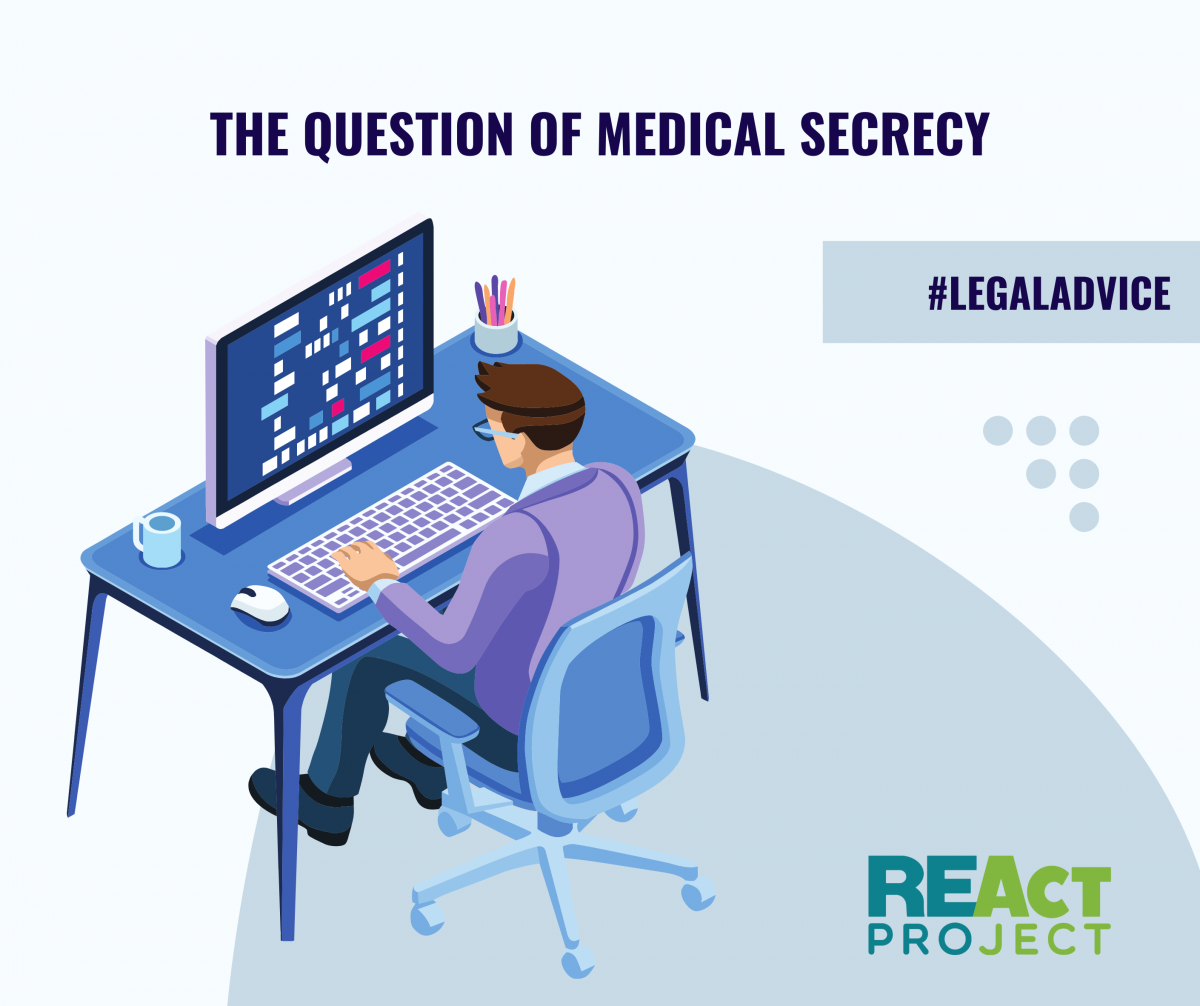Among the violations registered by the REAct project, reports on disclosure of the clients’ health status are outstanding. Such cases may have various consequences, ranging from the feeling of stigma and humiliation to forced relocation caused by denigration and bullying by the local community after HIV status disclosure.
Often, when patients with HIV-positive status are seeking medical care, they are concerned that the health and personal information they report to the physician will become available to third persons, especially in the context of HIV/AIDS? What are the guarantees of protection and how to use them?
The Law of Ukraine “The fundamentals of the legislature of Ukraine concerning healthcare” (Art. 39-1 and Art. 40) envisage the right to the confidentiality of the health status, the fact of seeking care, the diagnosis, and the findings of medical examination. Employers and schools are prohibited to request information on the diagnosis and treatment methods, as well as provision of such information upon such requests. It is highlighted that health professionals and other persons who, in performance of professional or official duties, became aware of the disease, medical examination, and its findings, the intimate and family life of the individual, do not have the right to disclose such information, except cases defined in the legislature. The Law of Ukraine “On preventing the dissemination of diseases caused by human immune deficiency virus (HIV) and legal and social protection of people living with HIV”, and other regulations envisage some guarantees of the right to medical confidentiality in the context of HIV.
What you need to know about medical confidentiality
All information related to somebody’s health and health-related circumstances is subject to medical confidentiality.
Including:
- The fact of seeking medical care in a health facility;
- Health assessment results;
- Medical diagnosis;
- Circumstances preceding or provoking the disease;
- Individual characteristics of the organism;
- Bad habits, mental characteristics and income status;
- Other information received during the medical visit, including information about family and intimate life, the health status of relatives and close people.
Physicians, nurses, other clinical and non-clinical staff, who, in performing their duties, became aware of the disease, do not have the right to disclose clinical and non-clinical information related to the person’s health status. Such information can be disclosed to a person authorized to receive such information, exclusively in cases envisaged by law, with compliance to all regulatory requirements ensured.
When can a doctor disclose medical confidentiality and under what circumstances?
Disclosure of information about a person’s positive HIV status to the person’s partner by health professionals is allowed in cases if the person living with HIV, gives relevant written authorization, or if such person has died, fainted or there is a likelihood that such person will not regain consciousness and recover his/her capacity to provide informed consent.
Sharing such information with other health professionals and health facilities is allowable only upon informed consent of the person living with HIV, for sharing such information. Such consent must be provided in writing and only for the purposes of treating the diseases caused by HIV and in a case if a physician’s awareness about the patient’s HIV status makes a significant difference for treatment.
Sharing such information with other third parties is allowed only upon a court decision in the cases defined by law.
“Other third parties” imply the inquest and investigation authorities and the court, and “cases” mean the criminal proceedings regarding the person or other legal grounds. It is important to know that sharing any confidential health information with the inquest and investigation authorities implies exclusively legal and procedural access to it. Access to such information is granted on the basis of Art. 162 of the Criminal Procedure Law of Ukraine and Art. 160, 163 of the Criminal Procedure Law of Ukraine governing the order of obtaining temporary access to things and documents containing legally protected secrecy based on the relevant request reviewed by the investigating judge.
This means that any efforts of, for example, police officers to access such information in other ways are unlawful and must be ignored by the healthcare staff.
The liability for disclosing confidential health information by healthcare workers is envisaged by Article 145 of the Criminal Code of Ukraine “On illegal disclosure of medical secrecy”. According to Article 132 of the Criminal Code of Ukraine, disclosure by a health facility official, a support employee who had unauthorized access to information, or another healthcare worker of information about medical examination of a person to detect human immune deficiency virus infection, or other incurable life-threatening infectious disease, or acquired immune deficiency syndrome and its outcomes which became known in the course of performing official or professional duties, is also subject to criminal liability.
A person who was harmed by restriction of his/her rights as a result of publicization or disclosure of his/her HIV status is entitled to file civil proceedings against the perpetrator claiming reparation according to Article 15 of the Law of Ukraine “On preventing the dissemination of diseases caused by human immune deficiency virus (HIV) and legal and social protection of people living with HIV”.


